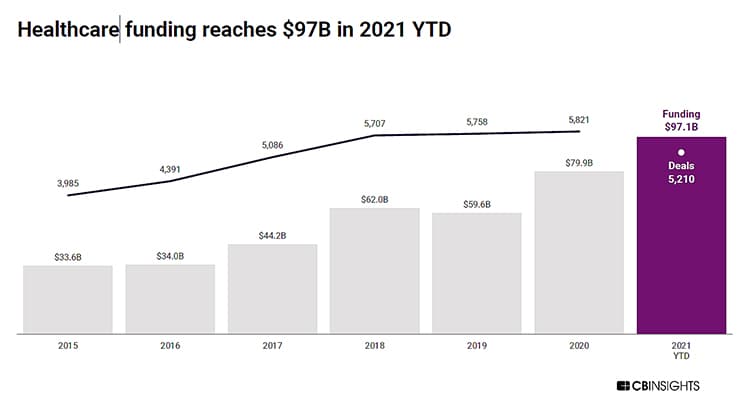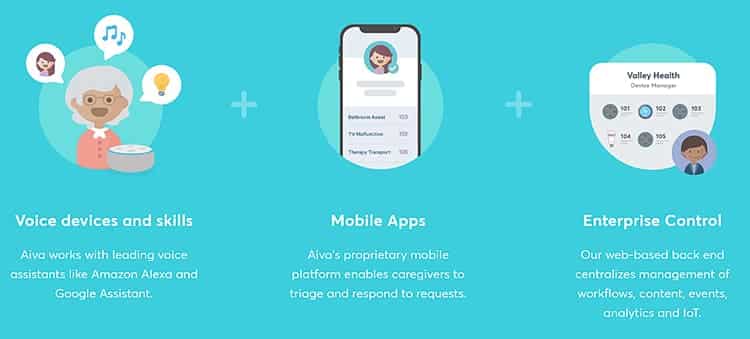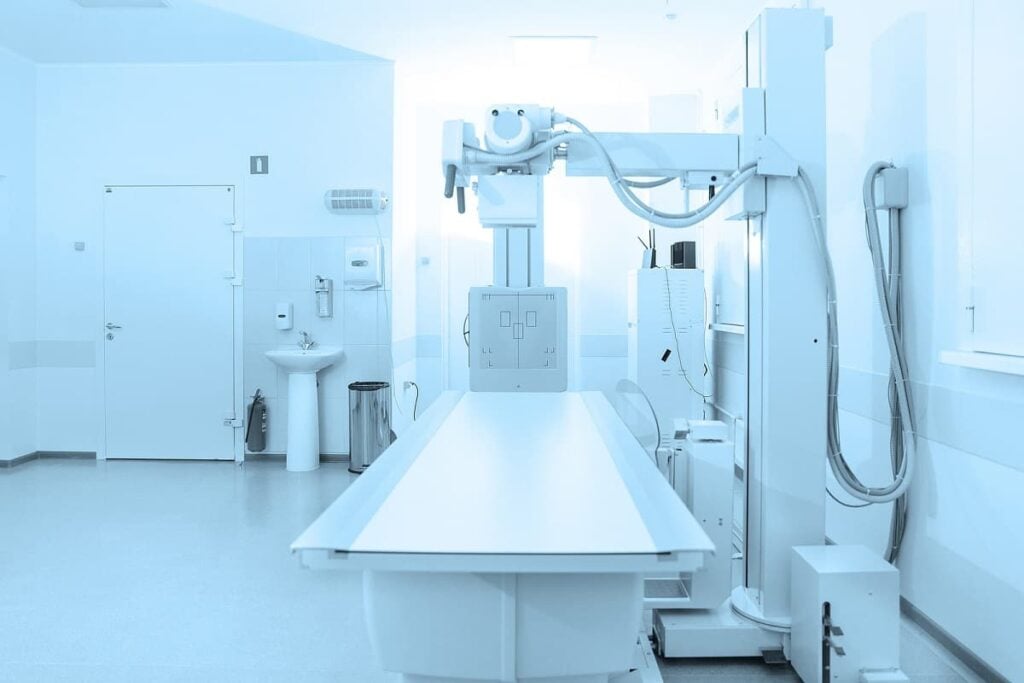Top Digital Health Companies That Amazon is Backing
Table of contents

Earlier this month, we profiled the latest frontline battle between Walmart (WMT) and Amazon (AMZN), with both retailers investing heavily in autonomous vehicle delivery. But that’s a mere skirmish compared to a much bigger prize: the $8.5 trillion global healthcare market, with the United States accounting for more than 40% of all spending at $3.65 trillion. There’s Walmart Health, which offers a number of in-store clinics and services, including optometry, dental, and even chiropractic. Meanwhile, the Amazon Care program is heavily digital, with telehealth services and in-person visits from caregivers in select locations.
About $1 out of every $5 invested in startups is going into healthcare funding, according to the big brains at data firm CB Insights. More than $97 billion has been poured into healthcare companies so far this year, compared to $80 billion in all of 2020. Now Amazon is getting into the act with its own accelerator program for digital health companies. Last month, Amazon Web Services announced its inaugural class of 10 startups selected from 427 applications across 31 countries. The technologies run the gamut from medical virtual assistants to remote patient monitoring to automating health services.

We thought it would be interesting to see what would soon be showing up on your Amazon Prime membership, so here are the top digital health companies in the world, according to Amazon.
Putting the Pieces Together
Most of the companies on this list claim to use artificial intelligence (AI) to diagnose, manage, treat, or predict health outcomes, including the startup that has raised the most funding to date.
Founded in 2015, Pieces Inc is based out of the Dallas, Texas area and has raised $61.5 million for its trio of health-based software solutions – Pieces Predict, Pieces Connect, and Pieces Guide. The first is the flagship platform that uses cloud-based AI to identify at-risk patients by scanning through their electronic medical records with natural language processing. Algorithms analyze structured and unstructured patient data to not only predict risks but the likelihood of readmission and probable outcomes based on social determinants.

In fact, Pieces emphasizes the social aspects of health through its two other solutions, Connect and Guide. The former is a software platform for managing social services for patients and the latter links patients to community services. As with any AI company, it’s all about the data. Toward that end, Pieces recently acquired fellow Dallas startup Bowtie Business Intelligence, which has developed a data management platform to connect and integrate data for analytical needs.
All-in-One Digital Healthcare Platforms
Founded in 2015, Baltimore-based b.well Connected Health is another company that seems a bit mature for an accelerator program, having raised nearly $59 million, including a $32 million Series B in July led by HLM Venture Partners, a VC firm that has invested in more than 100 healthcare technology companies. B.well has built one of those all-in-one digital health management platforms that unifies a patient’s data, from complete medical record information to wearable and genomic data, by connecting doctors, pharmacies, lab results, genetics, medications, and insurance information.

It then uses analytics to guide patients to take specific actions, with push notifications about things like upcoming vaccinations, discounted medications, or to put down that potato chip based on your last cholesterol check. Call it the consumerization of healthcare. Amazon will love it. About seven million people reportedly already use the app, which also has a telehealth feature for connecting with caregivers virtually.
Founded in 2016, New Yawk-based OneRecord takes a different riff on the all-in-one theme by consolidating all of a patient’s medical records in one cloud-based platform. U.S. law says doctors and insurance companies must give their patients access to their electronic medical records, and OneRecord provides a free app that does just that:

Users can tap on any of the fields to drill down into the types of medications that have been prescribed or review a history of their health data results. The app even stores immunization records, so you can flash your COVID-19 vax card for your next movie date.
Virtual Assistants for Healthcare
It’s becoming virtually impossible to track the number of companies rolling out AI healthcare chatbots or virtual assistants to help diagnose and direct patients to the proper care. Babylon Health is the most well known of the bunch and is planning to go public soon. But it faces a Gyant wave of competition.
Founded in 2016, San Francisco-based Gyant has raised $23 million for its AI solution, Front Door, which offers a symptom-checking chatbot similar to Babylon that integrates with a patient’s medical records. As the name implies, Front Door serves as the single point of entry on a patient’s digital journey through the hellscape known as the U.S. medical system by helping customers find a doctor or clinic, among other things. Gyant wasted no time jumping on the COVID-19 crazy train by deploying a dedicated pandemic virtual assistant in collaboration with Intermountain Healthcare, which saw its call center volume drop by 30%. Intermountain is one of about two dozen customers that use Front Door.
Not all virtual assistants are symptom-checking chatbots.
Founded in 2016, Aiva Health out of Los Angeles has raised just $100,000 in disclosed funding but both Amazon and Google invested in the startup back in 2018 in an undisclosed round. Aiva has developed what it calls a voice operating system (OS) specifically for healthcare. Aiva uses Google Home, Amazon Echo, and other smart speakers to connect patients with caregivers. There’s a mobile app for caregivers to manage help requests, a dashboard for performance reporting, and a backend for controlling the voice assistants’ settings and interactions with other IoT smart devices like TVs, lights, and thermostats. Elder care is one of the company’s key markets, integrating with motion detectors and other monitoring systems if grandpa falls and needs to order a hip replacement for two-day delivery.

Founded way back in 2012, San Francisco-based Ejenta has raised just $156,000 in disclosed funding to develop an AI-powered patient monitoring platform based on NASA technology used to monitor astronauts in space. It basically sounds like a more beefed-up version of the Aiva Health platform by integrating both sensors and wearables data through a virtual assistant the company calls intelligent agents. These agents leverage the data to learn about users, detect abnormalities, and predict health problems in advance. Forbes reported that a clinical test of the system by a large healthcare provider found that heart failure readmissions dropped by 56% thanks to the at-home patient engagement software.
Medical Informatics, which does remote patient monitoring minus the virtual assistant, is a company we previously covered, and not much has changed since then, so we’ll move on to …
The Netflix of Medical Education
Founded in 2015, GIBLIB out of LA has chipped away at raising $7.6 million across seven rounds, with the Mayo Clinic a notable investor. Describing itself ad nauseam as the Netflix of medical education, GIBLIB produces accredited content for medical professionals to earn continuing medical education credits. Basic subscription plans start at $200 per year, with higher-priced plans offering more bells and whistles in the company’s video platform, such as a note-taking feature and blow-by-blow transcripts from your favorite eyeball surgery video.
The Uber of Medical Transportation
Founded in 2016, Chicago-based Kaizen Health has raised $4.3 million to be the Uber of medical transportation. Medicaid spends about $3 billion per year on non-emergency medical transportation, and Kaizen is obviously trying to get a big slice of that pie. A patient’s care coordinator uses the company’s HIPAA-compliant platform to browse among a fleet of cars, small buses, non-emergency ambulances, hearses and more, to find the right mode of transportation. The system sends a reminder 24 hours before the appointment. Tips are optional.
VR for Physical Therapy
Founded in 2017, Fort Worth-based Neuro Rehab VR has raised just $225,000 for its FDA-registered virtual reality therapy system called XR Therapy Systems. VR healthcare startups like Neuro Rehab are using the technology in everything from physical therapy to pain management to medical training. In this case, the Texas company is using machine learning to design customized VR training exercises to address individual therapeutic needs. In a stroke patient, the company’s VR content improved her balance in seven months, while another patient recovered more quickly from an operation to fix a broken ankle bone by playing games like Fowl Play and Retail Therapy.
Conclusion
Some pretty obvious themes are evident among the companies on this digital healthcare surrounding AI in healthcare. Patients are increasingly being encouraged to self-triage through AI-powered app portals, which have access to not just all of their medical records, but metagenomics, medications, memes, and more. In effect, we’re creating digital twins of a person’s physical, mental, and social being. In theory, this enables caregivers to monitor health with a precision never before possible and take action before conditions worsen. The argument goes that this reduces healthcare costs over the long term, but the trend to decentralize and decouple medical care from brick-and-mortar settings is central to Amazon’s digitization and monetization of healthcare.
As the saying goes: An app a day will keep the doctor away.
Sign up to our newsletter to get more of our great research delivered straight to your inbox!
Nanalyze Weekly includes useful insights written by our team of underpaid MBAs, research on new disruptive technology stocks flying under the radar, and summaries of our recent research. Always 100% free.























